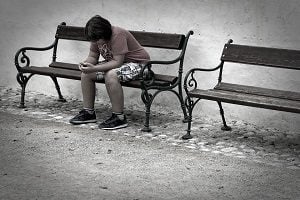
For all that young people tend to talk about how they are constantly connected to their friends through social media, a recent survey conducted by BBC Radio 4’s All In The Mind in conjunction with the Wellcome Trust found that people between the ages of 16 and 24 are actually more lonely than any other age group. A survey of more than 55,000 people found that nearly half of all young people reported that they felt lonely either often or very often.
Claudia Hammond, presenter of All In The Mind, wondered if the results were unique to modern life or if people naturally learned to deal with loneliness as they grew. “I wondered whether there is something about the stress of modern life, or young people’s ability to cope with it, that makes them feel lonelier. Or is youth simply a time of life when people feel isolation most keenly,” Hammond asked about the results.
The survey raises questions about whether or not loneliness is normal for young people, but it did confirm what other researchers have said about social media. It does not cure loneliness. If anything, it may only make it worse. According to the survey, those with more online-only friends felt lonelier than those who had more friends in real life.
“To help them to connect with others, young people today have social media. They are more connected than ever before,” Hammond said, “But this can bring its own problems. If you’re feeling lonely, looking at pictures of other people appearing to have endless fun isn’t going to help with those feelings of isolation.”
Social media has also been shown to decrease a person’s interest in seeking actual human conversation and connection while doing nothing to alleviate the need or replace the intimacy that comes with making real friends instead of merely virtual ones.
While young people tend to spend an alarmingly small amount of time interacting with real people, the internet alone may not be to blame for the high percentage of young people who feel lonely.
“Throughout the life course, you begin to realize loneliness is a feeling that doesn’t last forever,” Hammond said. “Younger people experience loneliness more intensely because it might be the first time they’ve experienced it at all.”
The age group with the highest loneliness rates, ages 16 to 24, supports this theory. It is during their late teens and early 20s that most people go to college or start their career. This often means leaving home and the support structure of a person’s hometown behind. Whatever the cause, the issue is clear, and a solution is needed. One can only hope someone finds it soon.


